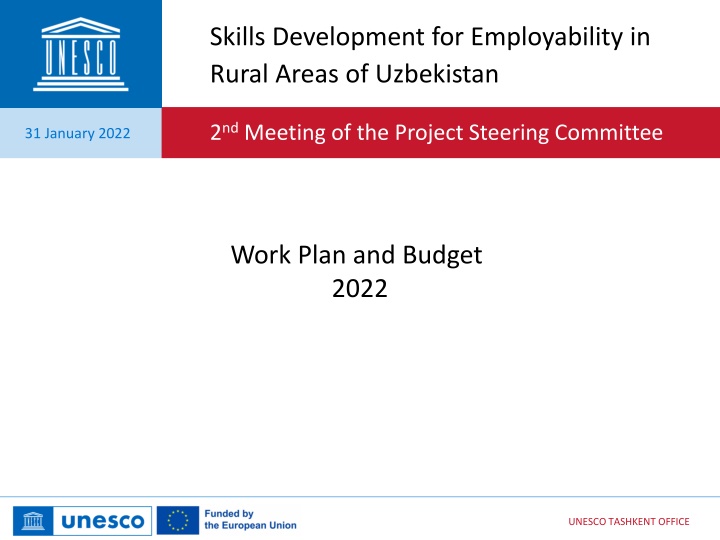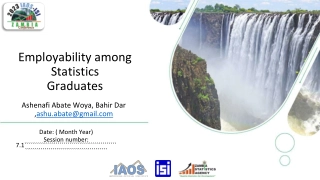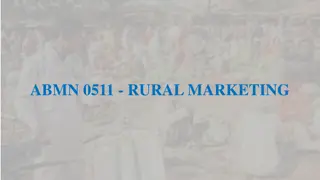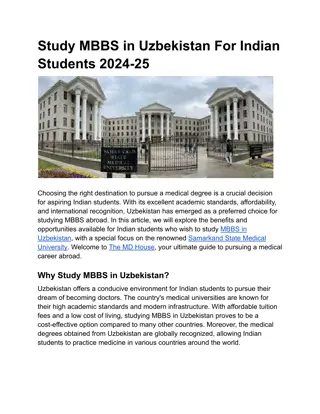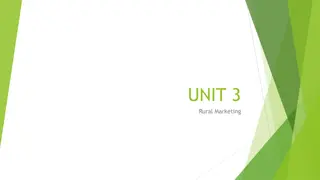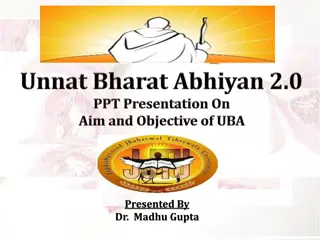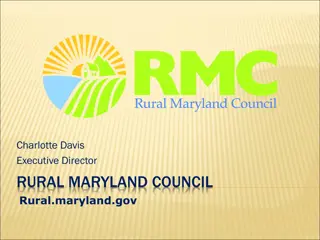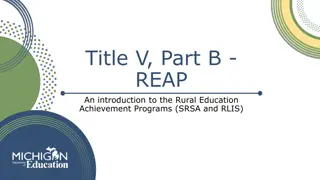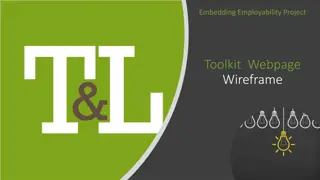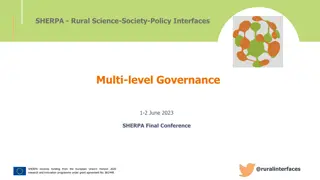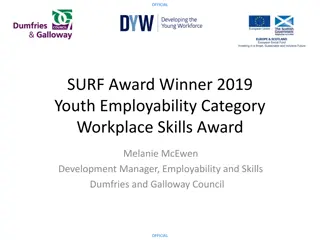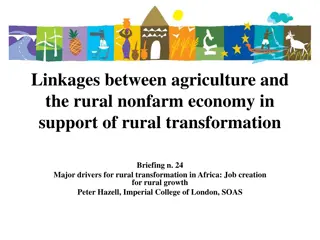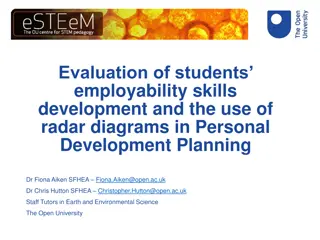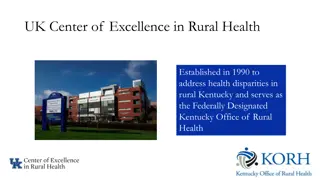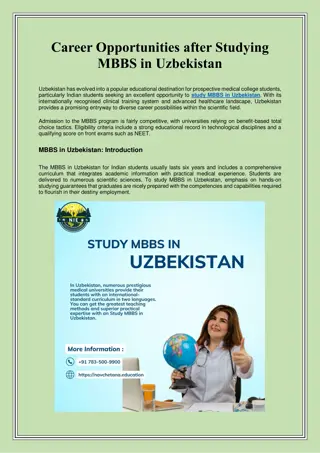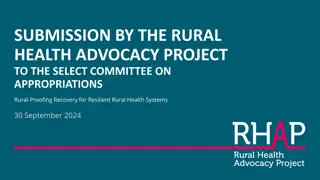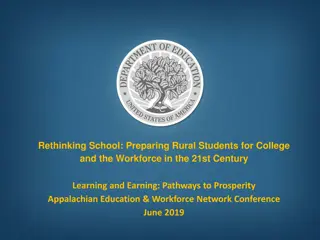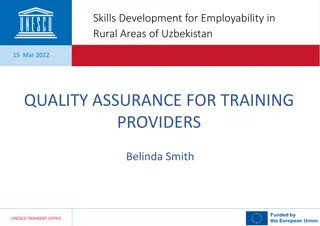Skills Development for Employability in Rural Areas of Uzbekistan
This project aims to enhance employability skills in rural areas of Uzbekistan, specifically focusing on agriculture and irrigation sectors. It involves developing governance structures, quality assurance frameworks, and capacity building for Sector Skills Councils. Activities include drafting strategies, legal frameworks, and implementing a grant scheme for social inclusion. The project also emphasizes collaboration with stakeholders and aligning strategies with existing frameworks.
Download Presentation

Please find below an Image/Link to download the presentation.
The content on the website is provided AS IS for your information and personal use only. It may not be sold, licensed, or shared on other websites without obtaining consent from the author.If you encounter any issues during the download, it is possible that the publisher has removed the file from their server.
You are allowed to download the files provided on this website for personal or commercial use, subject to the condition that they are used lawfully. All files are the property of their respective owners.
The content on the website is provided AS IS for your information and personal use only. It may not be sold, licensed, or shared on other websites without obtaining consent from the author.
E N D
Presentation Transcript
Skills Development for Employability in Rural Areas of Uzbekistan 2ndMeeting of the Project Steering Committee 31 January 2022 Work Plan and Budget 2022 UNESCO TASHKENT OFFICE
Two Main Activities in Component 1: 1. Develop a governance, management and quality assurance structure for skills development in agriculture and irrigation - Finalize the medium-term strategy and quality framework - Develop the Action Plan to implement the strategy 2. Operationalization/ improvement of the activities of Sector Skills Councils (SSCs) in Agriculture and Irrigation - Capacity Development (Training Workshops/ International knowledge exchange, Study tour) - Infrastructure: Equipment, furniture, PC etc. - Operationalization (SQF development etc) 2
Activities 1 2 3 4 5 6 7 8 9 101112 1.2.2. Develop a medium-term skills development strategy and action plans in agriculture and irrigation (end of June) Consultation of the draft strategy: Meetings with stakeholders and TWG 1 Validation National Workshop of the draft strategy Consultation of Action Plan at national level Consultation/ Preparation of Action Plan for Karakalpakstan and Khorezm Consultation/ Preparation of Action Plan for Bukhara and Surkhondaryo Validation National Workshop of Action Plan with costing Validation Regional Workshops of Action Plan in 4 regions (1 day/ region) National Seminar of the Strategy Implementation Action Plan Alignment of the strategy action plan with other existing strategies 1.2.3. Revise and strengthen a legal framework on governing skills development system in agricultural and irrigation Draft concept paper on legal framework on governing skills development in Ag/Ir 1.2.4. Develop quality framework for skills development in Ag/Ir Prepare a concept paper on quality assurance framework Consultation of the draft quality framework Validation National Workshop Launch the QA Framework and inter-Ministrial Coordination and roles and responsibilities 1.2.5. Develop and pilot a grant scheme on social inclusion to engage students from disadvantaged groups in agriculture and irrigation colleges 2023 and later 3
Activities 1 2 3 4 5 6 7 8 9 10 11 12 1.3.1. Enhance the capacities of SSCs for Agriculture and Irrigation Provide equipment (furniture, PC, etc) for operationalization Training Workshops on Capacity building of governance of SSC International knowledge exchange/ Study visit 1.3.2. Propose enhancement of regulations / provisions for SSC Update of SSC policy paper Validation Workshop for SSC policy paper Consultation of legal and regulatory framework and financial mobilization plan Develop/ update policy paper on legal and regulatory framework and financial mobilization plan Validation workshop of the policy paper Update the SSC s work plan 1.3.3. Alignment with other existing strategies 2023 4
Three Main Activities in Component 2: 1. Design a Sectoral Qualifications Framework (SQF) aligned to the National Qualification Framework (NQF) - Enhance/ update National Occupational Standard (NOS) 2. Design a methodology for building quality-assured sectoral qualifications in a modern skill production system 3. Institutional capacity building action plan - Pilot Agricultural Advisory Services (liaise with ongoing efforts) - Work-based learning and career guidance 5
Activities 1 2 3 4 5 6 7 8 9 10 11 12 2.2.1. Reach a common understanding of National Qualification Framework A two-day national workshop covering: NQFs, SQFs, NOS, Competency Based Training, Qualifications and Assessment 2.2.2. Carry out a functional analysis of agriculture and irrigation sectors 2.2.3. Development of the functional maps Submission of the functional analysis report/ occupational maps Workshop for occupational profiles Development/ Update of Functional maps Validation of the functional maps 2.2.4. Develop National Occupational Standards (NOS) for occupations in Ag/Ir in line with quality assurance standards Draft the documentation of quality processes for occupational standards development and qualifications. A two-day NOS writing workshop A two-day NOS consultation meetings with national and regional stakeholders A One-day NOS validation workshop in Tashkent with the SSC s. 2.2.5. Develop and pilot demand driven qualification in Ag/Ir colleges Workshop on development of Qualification Qualifications packaged Validation workshop on qualification in Tashkent with SSCs. Develop a one semester CBT module based on the NOS and qualification 2.2.6. Develop a tool to allocate a level of qualifications to occupations 2.2.7. Create/update a registry of sectoral professional standards 2.2.8. Create/update a sectoral registry of accredited qualifications in each sector 2.2.9. Create/update a registry of assessment centers 2.2.10. Regulate recognition of informal and non-formal learning in SQF With QA 2023 6
Activities 1 2 3 4 5 6 7 8 9 10 11 12 2.3.2. Develop a set of quality criteria on 5 key components (1. training providers, 2. awarding bodies, 3. SSC, 4. assessment centers, 5. trainers) of the skill production system at design, delivery and learning outcomes (of learners) level 2.3.2.1. Training Providers 2.3.2.2. Awarding Bodies (curricula) 2.3.2.3. Sector Skills Councils (qualifications) 2.3.2.4. Assessment Centers 2.3.2.5. Trainers Early 2023 7
Activities 1 2 3 4 5 6 7 8 9 10 11 12 2.4.7. Establishment and/or strengthening of advisory and extension centers at regional, and local levels (with EU ASK and WB) 2.4.9. Development of work-based learning arrangements and career guidance at agriculture and irrigation colleges and for resource mobilization prep 8
Main Activity in Component 3: - Develop teaching and training materials and modernize equipment and facilities for agriculture and irrigation colleges in four regions - (2023-) Conduct a graduate tracer study from agriculture and irrigation colleges - (2023-) Develop and pilot innovative grass-roots initiatives targeting rural population and vulnerable groups in four priority rural regions to support their access to employment, entrepreneurship and self- employment 9
Activities 1 2 3 4 5 6 7 8 9 10 11 12 3.2.1. Identify REAL site-specific needs assessment for specialties, professions in the agricultural and irrigation sectors 3.2.2. Review/ plan for aligning the educational directions at colleges 3.2.3. Review/ plan for aligning the academic plans 3.2.4. Review/ plan for aligning training programs (syllabi) 3.2.5. Update educational and training material 3.2.6. Improve the educational material base (libraries/information resource base) 3.2.7. Repair works/ upgrade facilities 3.2.8. Upgrade/ install equipment 3.2.9. Upgrade Internet connection 3.2.10. Digitize educational process 3.2.11. Upgrade qualification, expertise of pedagogical cadre of colleges and technical schools: 3.2.12. Fostering international collaboration of colleges and technical schools Plan of procurement at the colleges Evaluation Evaluation Evaluation 2023 Early 2023 together with 2.3.2.5 2023 Evaluation Engineer Procurement 10
College/ Tech school Remarks Building Equipment Gijduvon Technical School of Agricultural Technologies in Bukhara Repair Procurement Qizirik Technical School of Agricultural Technologies in Surkhandarya Repair Procurement Qoshkopir College of Water Resources and melioration in Khorezm Repair Procurement Kegeyli College of Water management and melioration in Karakalpakstan Repair Procurement Beruniy College of Water management and melioration in Karakalpakstan Better condition X Procurement Urgench Technical School of Agricultural Technologies in Khorezm WB project X X 11
Amount USD 1,411,731.06 1st installment Total cash disbursed 31 December 2021 Total ULO 31 December 2021 668,355.78 103,955.85 772,311.63 Amount Percentage 55% Total contract personnel committed in future periods 285,712.00 1,058,023.63 Amount Percentage 75% 12
Total in EUR all Years Total in EUR Year 2022 NO. COST CATEGORIES RESULT 1 Governance of skills development in the agriculture and irrigation sectors is modernized and strengthened in line with the labour market demands. RESULT 2 - Qualifications and methodologies of skills development are modernized to serve the needs of the labor market, learners and workers in the agriculture RESULT 3 Agriculture and irrigation colleges in rural areas are modernized with competent management and teaching staff using modern technologies and teaching and learning methods: Project Management Local office costs : Office Consumables - office supplies UNDSS joint activities (security costs) Other utility services (communication/heating, maintenance) Evaluation Communication and visibility Subtotal direct eligible costs of the Action Indirect costs (7% of subtotal of direct eligible costs of the Action) TOTAL 1 509,000 120,000 2 799,000 315,500 3 4,668,331 2,463,250 4,106,934 611,734 4 5 302,382 50,000 6 7 100,000 130,000 8,971,963 50,000 37,000 5,291,168 8 628,037 9,600,000 370,382 5,661,550 13
Thank you! 14
